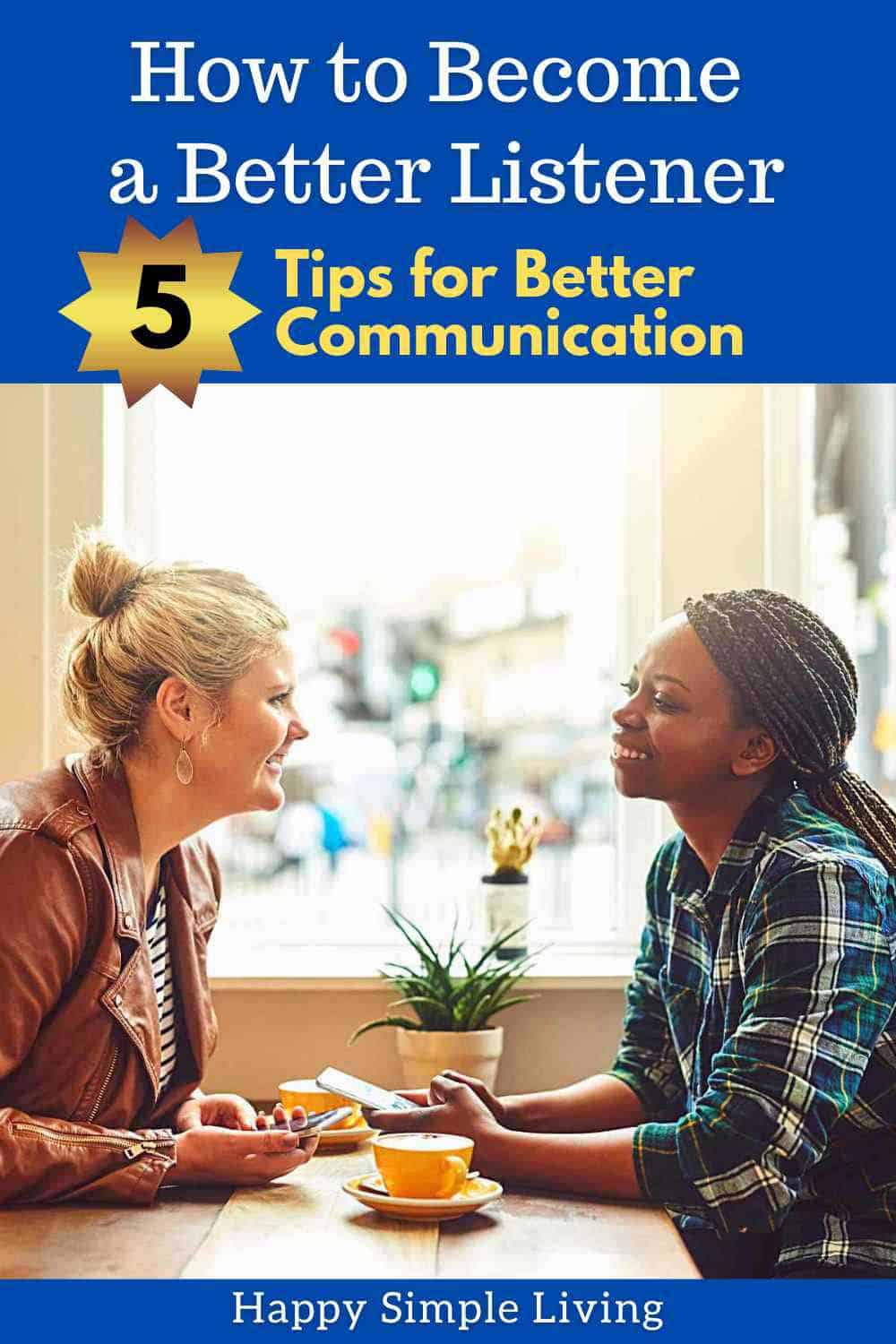Learning and practicing the art of listening can help us build stronger relationships, understand other people better, and improve our overall communication effectiveness.
In this post, we share five ways to be a more engaged listener and specific actions you can take to give another person your full attention.

Listening is a skill that can not only transform your relationships, it can have a positive influence on your performance at work and school, too.
According to listening expert Monica Brady Myerov, good listening skills can advance literacy and facilitate learning. Best of all, learning how to become a better listener is easy to do.
Don’t Be Like Me
Recently my son and I visited good friends for a weekend at their beautiful mountain home.
After devouring the delicious dinner they had prepared for us, we lingered at the table and talked.
I love that time, don’t you? Is there anything better than sipping the last of the wine, talking with good friends, and relishing simple companionship and good conversation?
My friend started to tell us an interesting story about watching a live show with knights in full armor that rode horses and participated in a jousting match. I wish I could remember where they saw the show, but I can’t.
The reason I can’t remember many details about my friend’s story is because while she was talking, I was only half-listening. I was busy thinking about my reply.
I Can Top That Story
When she paused, I told her that we, too, had once attended a live jousting match. It was when we were in Anaheim during our spring break trip to Disneyland.
We’d gone to a huge place called Medieval Times, where we had front row seats for the match. And oh, the best part of all was that they served a dinner in which you ate everything with your hands, real medieval-style!
Even the soup was served in handled pewter bowls, I explained, so that you could drink it without a spoon! After I had shared every fascinating detail about our live jousting match, we moved on to a new subject.
Later when I thought about our conversation, I was filled with regret over my maddening tendency to be in a hurry to talk – especially when a subject comes up that I CAN CONTRIBUTE TO, or even better, I CAN MAYBE EVEN TOP!
Talking Less and Listening More
I wish I would have given my dear friend my full attention, and actively listened to her story.
I wish I would have asked her some questions about the match. Why were they there, and who else did they go with? Did everyone enjoy the show? Was it interesting to get that glimpse into a centuries-old sport? Did she find it exciting? Did they take pictures?
Once she had taken as much time as she needed to tell me the anecdote in her own way, I wish I’d resisted the urge to share my similar tale. Next time, I hope I can be a better listener.
I want to be a friend who gives others the gift of being truly present, while listening more and talking less.
Here are 5 tips if you want to be a better listener, too.
How to Be an Engaged Listener

By following these tips, you can become a more engaged listener and improve your communication skills.
1. Pay Attention
The first tip for being an engaged listener is to give the speaker your undivided attention. Try to avoid distractions such as your phone, smart watch, or any other devices that might pull your focus away from the conversation.
2. Show Empathy
Make an effort to be fully present, and try to understand the speaker’s perspective, feelings and emotions.
This can be done by using body language such as nodding your head or making eye contact, which shows the speaker that you are actively listening.
3. Ask Questions
Asking questions helps clarify any misunderstandings and also shows that you are interested in the story or topic you’re discussing.
This practice also demonstrates that you are paying attention and actively trying to understand the speaker’s message.
4. Avoid Interruptions
Let the speaker finish what they are saying, and resist the temptation to jump in with your own story (like me and Medieval Times!). Hold your thoughts or opinions while listening.
5. Give the Speaker Feedback
You might summarize their main points, or acknowledge their feelings. This helps to ensure that you have understood their message correctly and also provides the speaker with the assurance that their story or message is being heard.
Active listening requires practice and a little extra effort, but the benefits are invaluable. If you have any tips to add to this list, drop a comment below!
Save for Later


Eliza Cross is the creator of Happy Simple Living, where she shares ideas to help busy people simplify cooking, gardening, holidays, home, and money. She is also the award-winning author of 17 cookbooks, including Small Bites and 101 Things To Do With Bacon.





The restaurant you were talking about was Medieval Times. My son had his birthday party there years ago.
I bet it was a fun place to have a birthday party. Did your son enjoy it? Did you?
I love that time in history, castles, knights etc., however once is enough for me. My son and his fiends enjoyed it more.
I agree, KC – once is enough but it was fun at the time.
Wow. I can certainly relate to your post. I think I do the same more times than I care to admit. It’s hard to know when you are doing it. It’s much easier to look back and know that you did. I’m working on it too.
Janis, good luck and thanks for your comment. I went to a dinner last week and tried being very aware of this habit. Instead of automatically jumping into the conversation, I listened and asked questions. I felt good at the end of the night, and I hope I can work on this and develop new habits.
I think I probably do that more than I should as well. Definitely a bad habit to work on. Thanks for the reminder. 🙂
Thanks, Ginny, and I love your blog Humble Alcove! Beautiful photo of the sunrise you just posted. 🙂
Hi Eliza..This is really nice and the photo is even nicer…Oh how I love to visit this restaurant…
Keira, have you been to Medieval Times more than once? I agree, it’s a fun place. My son especially loved it!
This is so true! I was just talking about how important it is to listen in business. A client called, and she got on the subject of her dog. Immediately I was thinking what to say about my dogs – but then I stopped, and told myself “no just listen.” It was a gift to me and to the client. The conversation became more relaxed and it felt like there was a more sincere connection. I am conscientiously making the choice to listen. It’s a switch for me – but I like it.
Thank you for your post. 🙂
Shirley, thanks for your comment. You make a good point, that letting go of the instinct to jump in is downright relaxing–another benefit of listening.
“I want to be a friend who gives others the gift of being truly present.
I want to be someone who listens with my whole heart.
I want to talk less.
I want to hear more.”
This is beautiful.
♥ Melissa @ Melissa’s Meanderings
I think we are ALL guilty of that, at least to some degree. But don’t beat yourself up, I think you’re a GREAT listener, and it’s just one of the things we all love about you. Nevertheless, thanks for the reminder… you’re spot on that we can all “learn to give that gift” a little better. Hugs back.
Eliza,
Thanks for sharing these thoughts about listening. I often say I was born with a listening impairment. It’s true. I alienated a good friend once by talking about myself so much. The name for it is “Conversational Narcissism”. Here is a link to an article I found helpful.
I haven’t tried this restaurant and I think people should also know about this…
Listening is definitely important especially in a relationship whether it is for friendship, family and for the partner…
My father have a gift (or curse) of talking 24/7 about things no one cares about. Say you dont care – you’ll be a bad person. Don’t say anything – you’ll be a bored to death person.
There is no escape and that for sure…but you know what ? I learn to listen…yeah i know i was kinda forced too but it just shows how there is a good side of everything…oh…sorry! gotta go – my father wants something…:)
Listening is definitely very important especially in a relationship…If we know how to listen, we know how to love too…
Listening is one of the best things that we can do for the people when they have their problems…
If people spent more time really listening to each other rather than focusing on our own actions and thoughts, the world would be a better place. Being truly present in the moment means really listening and absorbing other people’s words whether we choose to formulate a reply or not.